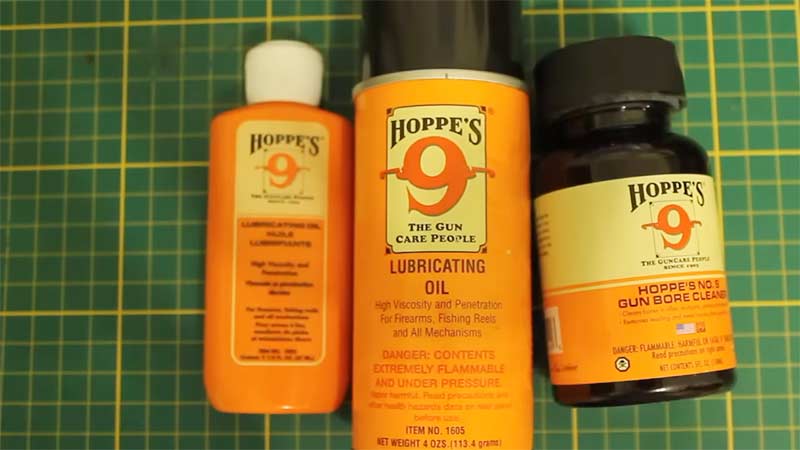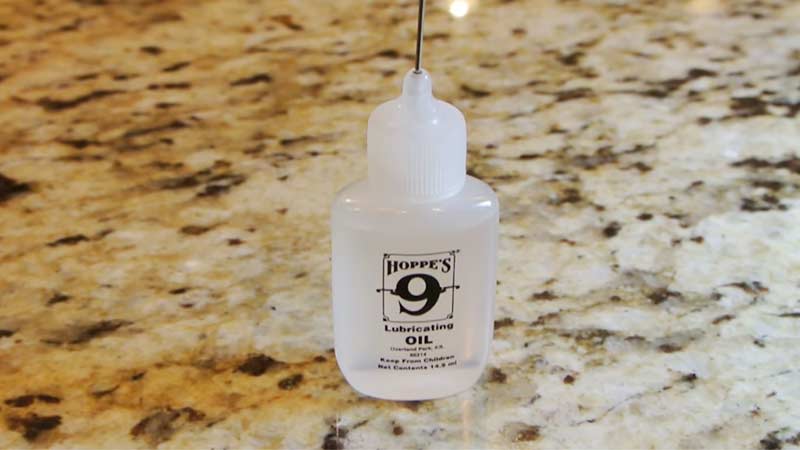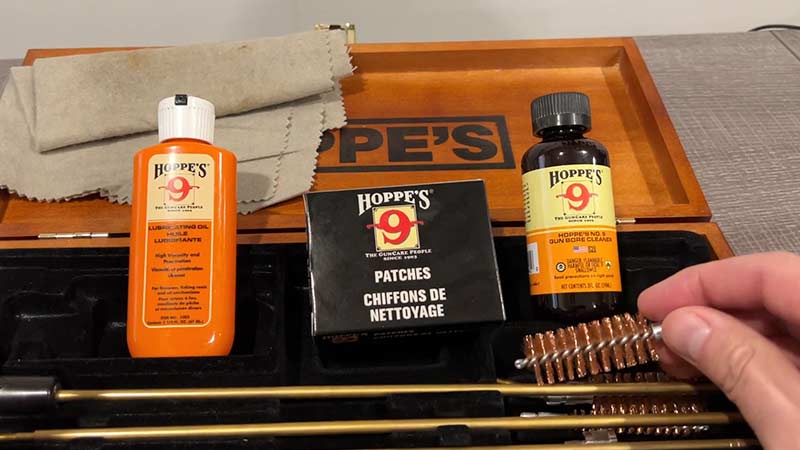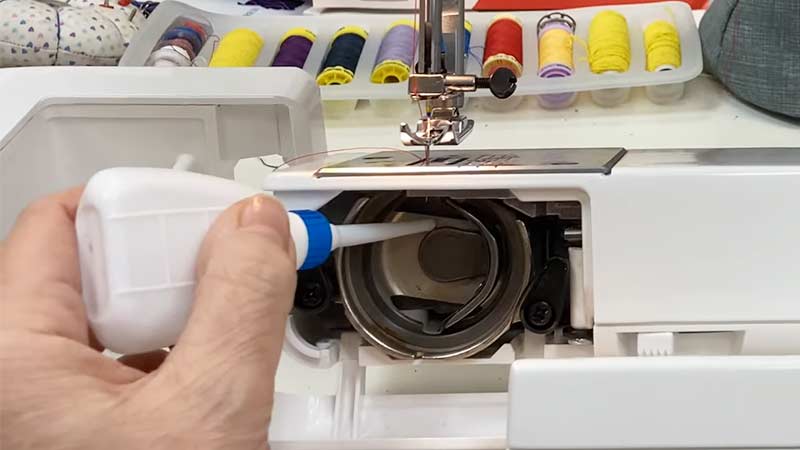Exploring the compatibility of Hoppes No. 9 Oil with sewing machines unveils a critical inquiry into the crossroads of lubrication between two diverse mechanical worlds.
Revered for its effectiveness in firearm maintenance, Hoppes No. 9 Oil sparks curiosity when considering the delicate mechanics of sewing apparatus.
As sewing enthusiasts seek optimal solutions for machinery care, questions arise regarding viscosity, material compatibility, and the potential impact on fabrics.
This investigation embarks on an insightful journey to discern whether a lubricant esteemed in the realm of firearms can seamlessly adapt to the nuanced requirements of sewing machines.
The intricate balance of efficacy and suitability unfolds as we delve into the intricacies of this lubrication dilemma.

What Is Hoppes No 9 Oil? Key Characteristics
Hoppes No. 9 Oil is a well-known and widely used lubricating oil primarily designed for firearms maintenance. It is produced by the Hoppe’s company, a brand recognized for its gun cleaning and maintenance products.
Here are the key characteristics of Hoppes No. 9 Oil:
Solvent-Based Formula
Hoppes No. 9 Oil is a solvent-based lubricant formulated to clean, protect, and lubricate firearms. It effectively removes powder fouling, lead, and metal fouling and prevents rust.
Versatile Lubricant
While its primary application is in the firearms industry, Hoppes No. 9 Oil is occasionally used for other mechanical applications that require lubrication and protection against corrosion.
Distinctive Odor
It has a unique and recognizable smell that some users find pleasant, while others may find it strong. The distinct odour is often associated with traditional gun cleaning rituals.
Long-Lasting Protection
Hoppes No. 9 Oil is known for providing lasting protection to metal surfaces. It helps prevent corrosion and wear on gun components.
Thin Viscosity
The oil has a relatively thin consistency, making it suitable for penetrating tight spaces and lubricating intricate gun parts.
Established Reputation
Hoppes No. 9 is among the oldest and most trusted brands in the firearms maintenance industry. It has a reputation for reliability and effectiveness in gun care.
Is Hoppes No 9 Oil OK for Sewing Machines? 4 Reasons

Using Hoppes No. 9 Oil for sewing machines is generally not recommended. While it is a popular and effective lubricant for firearms, its properties may not be suitable for sewing machine maintenance.
Here are some reasons why:
1. Viscosity
Sewing machines typically require a thicker oil to provide adequate lubrication for moving parts. Hoppes No. 9 Oil, known for its thin consistency, may not adhere well to sewing machine components.
2. Compatibility
Many sewing machines have plastic and rubber parts. The solvents in Hoppes No. 9 Oil could potentially damage these materials, leading to issues such as swelling, cracking, or deterioration.
3. Fabric Staining
Hoppes No. 9 Oil is a solvent-based lubricant; if it comes into contact with fabric, it may leave stains. This could be problematic for sewing projects where maintaining the appearance of the fabric is crucial.
4. Health and Safety
Hoppes No. 9 Oil contains chemicals that can be harmful if inhaled, ingested, or if they come into contact with the skin or eyes. Using it in an environment where safety precautions are not strictly followed may pose health risks.
7 Problems Can Occur When Using Hoppes No. 9 Oil on a Sewing Machine

Using Hoppes No. 9 Oil on a sewing machine may lead to several problems due to its specific characteristics and intended use for firearms maintenance.
Here are potential issues that can arise when using Hoppes No. 9 Oil on a sewing machine:
1. Inadequate Lubrication
Hoppes No. 9 Oil has a relatively thin viscosity, which may not provide sufficient lubrication for the moving parts of a sewing machine. Sewing machines typically require a thicker oil to ensure proper protection and smooth operation.
2. Material Compatibility Issues
Sewing machines often have plastic and rubber components in addition to metal parts. The solvents in Hoppes No. 9 Oil may not be compatible with these materials, potentially causing damage such as swelling, cracking, or deterioration over time.
3. Fabric Staining
Hoppes No. 9 Oil is a solvent-based lubricant; if it comes into contact with fabric, it may leave stains. This can be particularly problematic for sewing projects where maintaining the appearance of the fabric is crucial.
4. Health and Safety Concerns
The chemicals in Hoppes No. 9 Oil can be harmful if inhaled or ingested or if they come into contact with the skin or eyes. Using it in an environment where safety precautions are not strictly followed may pose health risks.
5. Residue Buildup
Over time, the use of Hoppes No. 9 Oil may lead to residue buildup on the sewing machine components. This residue can attract lint and dust, potentially affecting the machine’s performance.
6. Odor Transfer
The distinctive odour of Hoppes No. 9 Oil may transfer to fabrics during sewing, affecting the overall scent of finished projects.
7. Difficulty in Cleaning
Cleaning a sewing machine that has been lubricated with Hoppes No. 9 Oil may require special attention and solvents to remove the oil effectively.
7 Alternatives to Hoppes No. 9 Oil for Sewing Machines?

When it comes to lubricating sewing machines, it’s advisable to use oils specifically designed for this purpose. Here are some alternatives to Hoppes No. 9 Oil for sewing machines:
1. Sewing Machine Oil
Purpose-formulated sewing machine oils are widely available. These oils have the right viscosity to provide effective lubrication without causing damage to plastic or rubber components.
They are clear, odourless, and designed to enhance the performance of sewing machines.
2. Synthetic Oils
Certain synthetic oils are designed for machinery lubrication and can be suitable for sewing machines. Look for synthetic oils that are explicitly labelled as safe for sewing machines and compatible with their materials.
3. White Mineral Oil
White mineral oil, often used as a lubricant in various applications, can be an alternative for sewing machines. It is clear, odourless, and has a neutral effect on materials. Ensure it is labelled safe for sewing machines.
4. Tri-Flow Sewing Machine Oil
Tri-Flow brand produces lubricants for various applications, including sewing machines. Tri-Flow Sewing Machine Oil is formulated to provide smooth operation, reduce friction, and prevent rust in sewing machines.
5. Zoom Spout Sewing Machine Oil
Zoom Spout is a brand known for its precision applicator, making it easy to apply oil precisely where needed. Zoom Spout Sewing Machine Oil is designed for sewing machines and other delicate mechanisms.
6. Food-Grade Mineral Oil
Food-grade mineral oil is another alternative. Ensure that it is labeled safe for contact with food and is suitable for sewing machines. It’s clear, odorless, and generally safe for various materials.
7. Nano-Oil
Nano-oil is a lubricant that uses nano-particles to penetrate and protect surfaces. It is designed for precision applications and can be suitable for sewing machines when used in accordance with the manufacturer’s recommendations.
Can Hoppes No. 9 Oil Damage My Sewing Machine?
Using Hoppes No. 9 Oil on a sewing machine poses potential risks. The oil’s thin viscosity may not provide adequate lubrication for the machine’s moving parts.
Additionally, the solvents in the oil can be incompatible with plastic and rubber components, leading to damage such as swelling or cracking. There’s a risk of fabric staining if the oil comes into contact with materials during sewing.
Furthermore, the oil contains chemicals that can harm health if inhaled, ingested, or if they come into contact with the skin or eyes. It is advisable to use oils specifically designed for sewing machines to prevent these issues.
FAQs
Is Hoppes No. 9 Oil suitable for sewing machines?
While Hoppes No. 9 Oil is a renowned lubricant for firearms, it may not be ideal for sewing machines. Sewing machines often require specific oils for optimal performance.
Can I use Hoppes No. 9 Oil as a substitute for sewing machine oil?
It’s not recommended. Hoppes No. 9 Oil may have a thin consistency and contains solvents that could harm plastic and rubber components in sewing machines.
Can I mix Hoppes No. 9 Oil with sewing machine oil?
It’s not recommended. Mixing different oils may affect performance. Stick to the recommended oil type for your sewing machine.
How can I clean my sewing machine if I’ve used Hoppes No. 9 Oil?
Clean the machine thoroughly with a recommended sewing machine cleaner. Remove any Hoppes No. 9 Oil residue to prevent potential machine performance issues.
To Recap
The foray into the compatibility of Hoppes No. 9 Oil with sewing machines underscores the importance of precision in lubrication choices.
While the oil is a venerable solution for firearms, its transferability to the intricate world of sewing machinery appears less than ideal.
The potential drawbacks, including viscosity mismatches, material incompatibility, and fabric staining, advocate for the use of specialized sewing machine oils.
As sewing enthusiasts prioritize their equipment’s longevity and optimal performance, selecting purpose-formulated lubricants becomes paramount.
The journey through this exploration signals a need for tailored solutions, emphasizing the significance of choosing lubricants that align seamlessly with the unique demands of sewing machines.
Leave a Reply